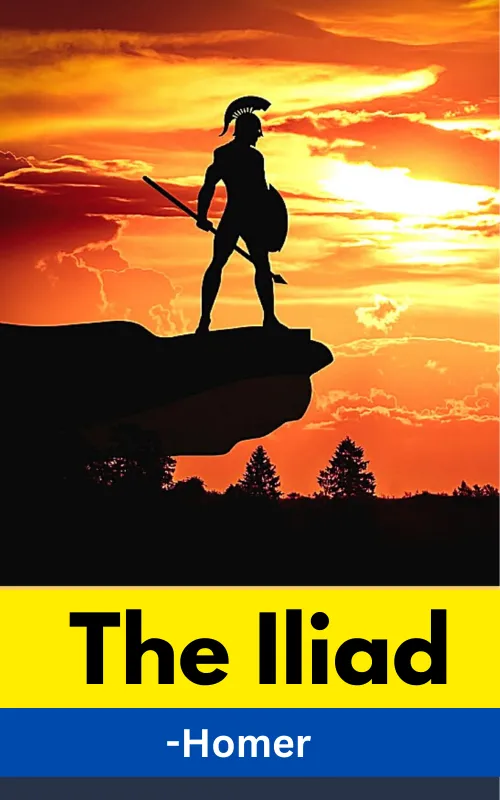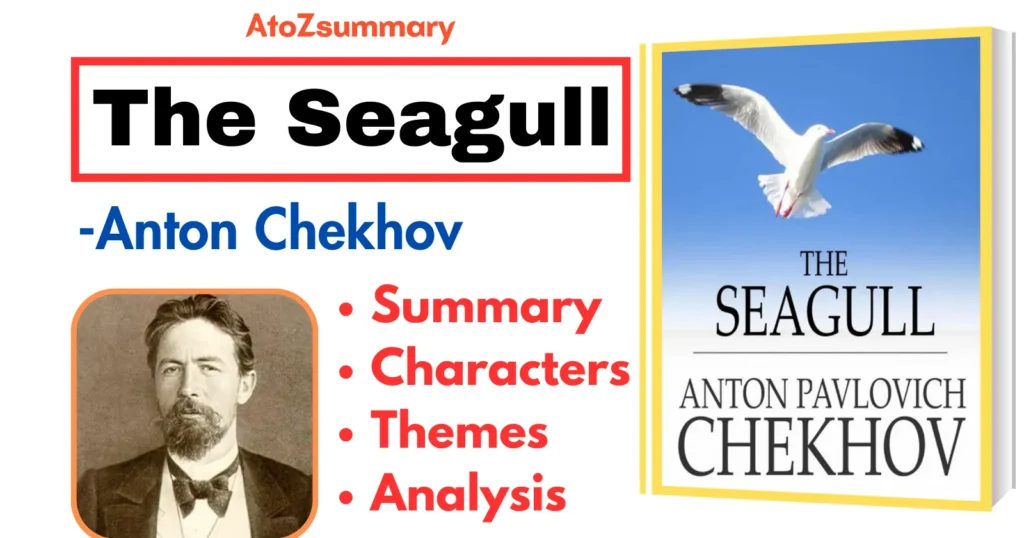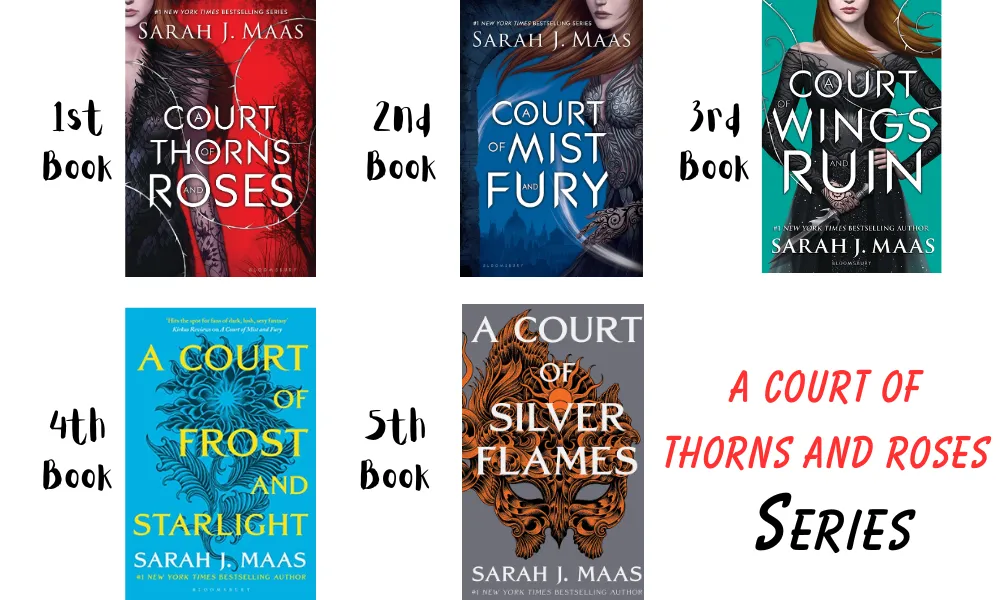About Poem: The Iliad
| Poem title | The Iliad |
| Author | Homer (Traditionally attributed to him) |
| Type of poem | Epic poem |
| Date of Composition | Estimated to be composed in the 8th century BCE |
| Speaker | Various characters in the poem, including Achilles, Hector, and Zeus |
| Genre | Epic Poetry |
| Setting | Ancient Greece and Troy, c. 1200 BCE |
| Literary techniques | Epic meter, simile, metaphor, personification |
| Structure | 24 books, divided into two parts |
| Total Lines | 15,693 lines |
Themes: The Iliad
The themes of “The Iliad” by Homer are:
- War and Conflict ➤ The poem explores the brutal and destructive nature of war.
- Heroism ➤ It celebrates the heroism of warriors like Achilles and Hector.
- Fate and the Gods ➤ Fate and divine intervention play a significant role in the lives of mortals.
- Grief and Loss ➤ The poem depicts the profound grief and loss experienced by characters.
- Honor and Glory ➤ Characters are driven by the desire for honor and glory in battle.
Characters: The Iliad
The main characters of “The Iliad” by Homer are:
- Achilles: A powerful Greek warrior with incredible combat skills.
- Hector: A brave Trojan prince and warrior.
- Agamemnon: The Greek commander-in-chief.
- Priam: The elderly king of Troy.
- Helen: The cause of the Trojan War, known for her beauty.
- Paris: A Trojan prince who elopes with Helen.
- Odysseus: A cunning Greek hero and king, known for his intelligence.
- Patroclus: Achilles’ close friend and companion.
- Andromache: Hector’s loving wife.
- Thetis: Achilles’ mother and a sea goddess.
The Iliad Summary & Analysis
Homer’s epic poem, “The Iliad,” is a foundational work of Western literature that chronicles the events of the Trojan War. Composed in ancient Greece, this epic poem consists of 24 books or chapters, and within its 15,693 lines.
Book 1
The Iliad begins with a plea to the Muse for inspiration and recounts the anger of Achilles. Agamemnon, the Greek leader, has taken Achilles’ war prize, Briseis, leading to a heated argument. Achilles withdraws from the battle, and his absence greatly affects the Greek forces.
Book 2
Agamemnon decides to test the Greek soldiers’ resolve by announcing his intention to return to Greece. Nestor suggests using an embassy to persuade Achilles to rejoin the fight. Agamemnon agrees, and Odysseus, Ajax, and Phoenix visit Achilles, but he refuses to return.
Book 3
The Trojans and Greeks prepare for a duel between Paris and Menelaus to end the war. Helen and Priam, the Trojan king, watch the duel from the walls of Troy. The duel ends inconclusively when the goddess Aphrodite saves Paris and transports him back to the city.
Book 4
The gods on Mount Olympus debate the war’s outcome. Zeus, the king of the gods, sends Athena to manipulate the Trojan archer Pandarus into breaking the truce, reigniting the battle. This leads to heavy fighting on the battlefield.
Book 5
Diomedes, a Greek hero, goes on a rampage, aided by Athena, and kills numerous Trojan warriors. He even wounds two gods, Ares and Aphrodite. This book emphasizes the power and capriciousness of the gods.
Book 6
This book offers a glimpse of Hector, the Trojan hero’s personal life. Hector visits his wife Andromache and their young son Astyanax. The tender moment is contrasted with his impending return to the battlefield.
Book 7
The Trojans and Greeks agree to a temporary truce to bury their dead. Hector challenges the Greeks to a duel, and Ajax accepts. The duel ends in a draw, and both sides honor the truce to hold funeral rites for their fallen warriors.
Book 8
The gods manipulate the war once again. Zeus forbids the gods from interfering, except for Hector. The Greeks are initially successful but are later driven back by the Trojans. The tide of battle shifts.
Book 9
The Greek leaders, fearing defeat, send an embassy to Achilles once more. This time, they offer him valuable gifts, his war prize Briseis, and an apology. Achilles remains adamant in his refusal and wishes the Greeks ill.
Book 10
Diomedes and Odysseus undertake a night raid on the Trojan camp. They kill many Trojans, including the leader Rhesus, and steal the Trojans’ prized horses. This episode shows the cunning and valor of the Greeks.
Book 11
The Trojans, led by Hector, put pressure on the Greek camp. The Greeks are overwhelmed, and the wounded Patroclus visits Achilles, begging him to return to battle. Achilles agrees to let Patroclus wear his armor and lead the Myrmidons.
Book 12
The Greeks continue to falter in the absence of Achilles, and the Trojans approach the Greek ships. Sarpedon, a Trojan ally, is killed by Patroclus, emphasizing the idea of heroism and fate.
Book 13
Hector kills Patroclus, wearing Achilles’ armor, and takes it as a war prize. This tragedy spurs Achilles to return to battle to avenge his friend’s death. This event marks a significant turning point in the narrative.
Book 14
The gods on Mount Olympus intervene directly in the conflict. Hera, Athena, and Poseidon support the Greeks, while Apollo, Ares, and Aphrodite support the Trojans. The divine intervention further exacerbates the conflict.
Book 15
Achilles, fully armored and back in battle, leads the Greeks to push the Trojans back. The Greeks build a protective wall around their ships. However, the Trojans hold a council to discuss their dire situation.
Book 16
Achilles continues to fight, killing numerous Trojans. He eventually confronts Hector, who is initially frightened but finds the courage to duel Achilles. Hector is no match for Achilles, who kills him and defiles his body.
Book 17
Hector’s body is dragged behind Achilles’ chariot, further angering the gods. Achilles continues to mutilate Hector’s corpse, sparking a divine feud over his treatment.
Book 18
Achilles mourns the loss of Patroclus and decides to have new armor crafted by the divine blacksmith, Hephaestus. Thetis, Achilles’ mother, secures the armor from the gods. Achilles’ grief and rage are prominent in this book.
Book 19
Achilles reconciles with Agamemnon, and the Greek leaders prepare for a major offensive against the Trojans. Achilles receives his new armor and is ready to rejoin the battle.
Book 20
The gods continue to influence the outcome of the war. Zeus allows the gods to return to the battlefield, and a great divine battle ensues. The gods take sides and influence the mortal warriors.
Book 21
Achilles, driven by rage and vengeance, relentlessly chases Hector around the walls of Troy. Hector is eventually tricked by Athena into standing his ground, leading to a fateful duel between the two great heroes.
Book 22
Achilles defeats Hector in the duel, mortally wounding him. Hector pleads for his body to be returned to his family, but Achilles coldly refuses. Hector dies, and Achilles dishonors his body, dragging it behind his chariot.
Book 23
Achilles arranges funeral games in honor of Patroclus. These include a chariot race, boxing, wrestling, and a fierce duel between the heroes. The Greeks and Trojans mourn Patroclus and celebrate his memory.
Book 24
Priam, Hector’s father, decides to go to Achilles’ tent to beg for his son’s body. He invokes the memory of his own father, and Achilles is moved by his grief. Achilles agrees to return Hector’s body, marking a moment of humanity amidst the brutal war.
FAQs: The Iliad
What is the main story of the Iliad?
The main story of the Iliad is the wrath of Achilles and its devastating consequences.
Should I read the Iliad or the Odyssey first?
If you are new to Homer’s epic poems, it is generally recommended to read the Iliad first.
What do you need to know before reading the Iliad?
Before reading The Iliad, it is helpful to have some basic knowledge of Greek mythology and the story of the Trojan War. This will help you to understand the poem’s characters, plot, and themes.
What caused the Trojan War?
The Trojan War was caused by the abduction (or elopement) of Helen of Sparta by Paris, the son of the Trojan king.
Who won the Trojan War?
The Greeks won the Trojan War, but at a great cost.
Who is the hero of the Iliad?
The hero of The Iliad is Achilles, the greatest warrior in the Greek army.
Who is the villain in the Iliad?
The main villain is Paris, who causes the Trojan War by abducting Helen.
Why is the Iliad important today?
The Iliad is important today because it is a timeless story about the human cost of war and the importance of peace.
How did The Iliad end?
The Iliad ends with the funeral of Hector, the Trojan prince who was killed by Achilles.











